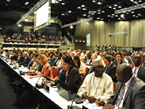At last month’s annual conference of the American Legislative Exchange Council (ALEC), a bipartisan group of legislators “amended a model resolution in opposition to federal efforts to enhance global tax enforcement,” write Americans for Tax Reform’s Grover Norquist and Patrick Gleason at Politico.
The move was designed to push back on federal officials “coordinating with other nations for the purpose of creating worldwide tax enforcement,” and on the Obama administration which, per Norquist and Gleason, has been making “unprecedented efforts to step up global tax enforcement.”
Both issues are attracting concern as legislators are looking to promote and implement policy that will enable their states better to compete on the global stage, and attract jobs and investment.
While the economic downturn has seen the development of a new bipartisan consensus that federal tax reforms must be pursued to shore up American competitiveness, worries exist that simultaneous efforts to push global taxes and global tax enforcement could minimize or negate advantages that could be gained, were beneficial corporate tax reforms implemented at the federal level.
Such proposed global taxes include a global carbon tax, a global financial transactions tax and a global tobacco tax, all of which have been pushed by the United Nations or subsidiaries of it in recent years.
In 2007, participants at a UN conference pushed for the adoption of a global carbon tax.
The UN Development Program (UNDP) has allegedly long been a fan of a global financial transaction tax. According to the Center for Freedom and Prosperity, the UNDP has pushed “for this levy for decades. Most recently, the 2011 Human Development Report, commissioned by the UNDP, called for a global redistribution regime – financed by taxes on either international currency or financial transactions – in order to promote ‘social justice within and amongst nations,’ and ‘to fund the fight against climate change and extreme poverty.'”
Recently, the World Health Organization (WHO), another UN subsidiary, has apparently jumped on the bandwagon, again pushing a financial transaction tax. The WHO is also urging the establishment of a global cigarette tax, with some of the tax’s proceeds going to fund WHO activities.
Critics charge that such global tax initiatives, if implemented, would not only undermine national sovereignty and prove far removed from those affected by them, thus limiting accountability. They would also have an adverse economic and fiscal impact– and potentially, in the case of the tobacco tax at least, promote smuggling while failing to improve public health.
In a recent CCTV interview on the subject, David Williams, President of the Alexandria, Virginia based Taxpayer Protection Alliance, said “We think that tobacco taxes are fool’s gold, because you always hear about all this revenue that’s gonna come in from tobacco taxes, it never materializes and what happens is when you raise taxes, you’re gonna hurt farmers and really the whole industry, and you’re gonna bring up the illicit trade because there are a lot of illegal cigarettes in the world. So you’re not really reducing tobacco use, you’re just shifting it from the legal stuff to the illegal stuff.”
Williams asserts that the examples of tobacco tax increases in Malaysia and Ireland prove his point. “We’ve seen in Malaysia and Ireland, where they’ve raised taxes, and right now, the World Health Organization, they want tax to be 70% of the cost of a pack of cigarettes,” he told CCTV. “In Malaysia and Ireland, we saw that they said smoking went down? No. no, just the purchase of legal cigarettes went down and the illicit trade went up.”
That has not caused the WHO to deep-six its proposal once and for all, though in the absence of such a tax, the WHO has been pushing individual countries such as China and the Philippines to hike their own cigarette taxes (in the case of the Philippines, the proposed increase is reportedly about 700%).
That, in turn, has taxpayer advocates here in the U.S. taking even more note, as American legislators look to lay down a marker with regard to global taxes and global tax enforcement.
Scrutiny of the activities of international organizations is generally less vigorous than that of national political debates; however, this trend may make it trickier for the UN to pursue initiatives like these in the future.

COMMENTS
Please let us know if you're having issues with commenting.